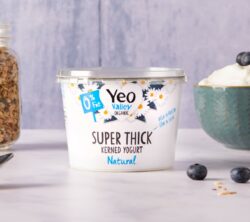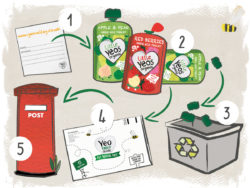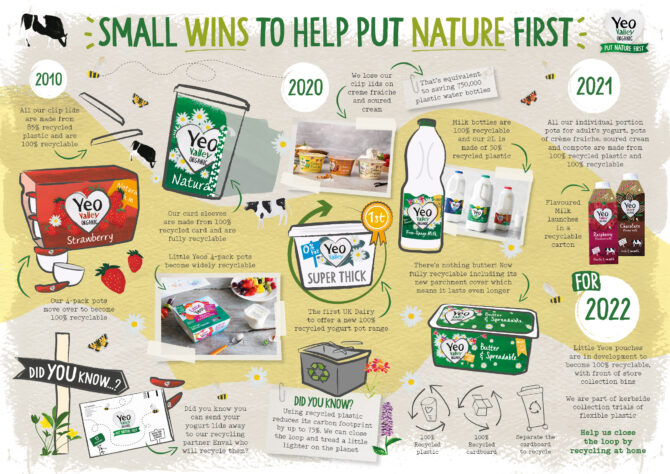Thursday 17th March 2022
I want to start this article by affirming: it’s not you.
Trying to work out what can go in the recycling bin, what needs to go to landfill (gulp), and what in the world to do with compostable/biodegradable packaging is a rubbish dilemma we all face daily.
And, I know, more than most. I spent a long time trying to resolve it as my journalism career took me on crack-of-dawn rides with bin men across London and to the heart of recycling facilities.
I was operating on the assumption it was a dilemma that could be solved – all we needed was the right information and we could create a one-stop guide of what goes in what bin. Simple!
I failed spectacularly to do this.
But I’m not the only one. We’re all failing spectacularly to deal with our rubbish.
Total waste from households increased to 22.6 million tonnes in 2020 from 22.1 million tonnes in 2019, according to the latest government statistics. Alongside this, the total amount of recycled waste from households decreased. (Don’t be too downhearted – the good news is, it was only by 1.2%). [1]
But, the problem wasn’t me. And I repeat, it’s not you. It’s the system.
The question isn’t just about what we as consumers need to do with our rubbish and recycling. It’s bigger than that. It’s about how we restructure the waste and recycling system.
That’s exactly what Joe Bower, Yeo Valley’s Packaging Procurement Manager, spends his days working on. So, we wanted to find out more and ask if he could provide us with some clarification…

Hi Joe. Nice to meet you. First up, can you tell us a little about you…
“Hello, sure. I’m one of the packaging geeks at Yeo Valley and I love it! Sustainability is close to my heart, so I’m proud to be working for a company that recognises the severity of the environmental crisis and the challenges we’re facing, but also actively invests in genuine sustainable solutions to tackle them.
“I’ve learnt so much in my role. Like most people, at the start of my career, I had no idea what the different kinds of plastic were or the various properties they had. I was operating under the false assumption that rigid plastic was recyclable and flexible plastic wasn’t. But, it’s so much more complex than that. So, as it turns out, I had unknowingly been putting non-recyclable plastic into the recycling bin for ages.”
Hopefully you can help ensure we don’t make the same mistakes. To set the scene, is plastic intrinsically bad?
“There’s quite a few sides to that question!
“In terms of carbon footprint, plastic is actually one of the most sustainable food packaging materials, because it’s so light and it has really good recyclability. It also keeps products fresh for longer and gets products to peoples’ homes intact, which is really important when it comes to reducing food waste.
“The issue we have with plastic is that too much of it is escaping into the environment which is unacceptable. But, that’s a problem with the waste stream rather than the material itself.
“We need to reduce the amount of plastic we use. We need to recycle plastic properly. But, in terms of eliminating plastic entirely, I’d say that’s not always the right choice.”
So, at Yeo Valley Organic you’re sticking with plastic yogurt pots?

“Yes. Our customers ask: “Why don’t you switch to glass?” or “Why aren’t you using aluminium?” and they’re valid questions considering the headlines in the media and the misinformation online.
“It would be an easy marketing win to switch to glass. But, that decision would be made on sentiment rather than robust data and analysis. And it would end up doing more harm than good.
“For example glass milk bottles, in comparison, generate a much higher carbon footprint because a lot of energy heat is required to blow glass. The same can be said for recycling glass, too. Plus, glass is heavy and glass milk bottles don’t nest inside each other has to be shipped in it’s blown form so shipping around glass milk bottles is less carbon-efficient. Glass bottles have the benefit of being reusable and they tend to last about 18 uses on average [2], which spreads the carbon footprint.
“However, plastic has a dramatically lower carbon footprint than glass and aluminium – as long as it’s treated properly at the end of life. Recycled plastic has a lower carbon footprint still. That’s why we’re sticking to plastic pots.
“After a year-and-a-half of trials, we’ve managed to implement 100% recycled plastic for the majority of our range. We also wrap our yogurt pots with 100% recycled card. Plus, they have very clear recycling instructions.
“But, no matter how good the material is, we are firm believers that less packaging is always better. Our default motto is “Remove, Reduce, Reuse, Recycle”. Reduce where you can by removing all unnecessary packaging. If you can’t remove it, then look to reuse it. And if you can’t reuse it, recycle it. If you can’t remove it, then look to reduce it. If you can’t reduce it, look to make it reusable. And if you can’t reuse it, make it recyclable and add in recycled content.

“At Yeo Valley Organic we’re strict in assessing what parts of our packaging are unnecessary. For example, we’re going to trial taking the lids off yogurt pots. If successful, that will remove 40 million lids and 120 tonnes of material, reducing CO2e by 742 tonnes – which is huge.
“But, we have to be cautious, because we don’t want to negatively impact food waste (remember that’s the majority of a product’s carbon footprint). It’s important that we take this holistic view when assessing our packaging’s sustainability.”
Who knew so much thought went into a yogurt pot! That’s a really powerful insight into how complex the problem is… are customers generally understanding of decisions you make?
“Our customers trust us to do the right thing. We try to regularly consult with them and keep open communication. We’re transparent about our decisions, but we can’t solve the waste and recycling issue alone – it requires everyone in the food industry, the Government and local authorities to work together.”
So that we can still be part of the solution in the meantime, can you give us any recycling tips?
One tip I would give is to look for the OPRL labels when trying to determine if something is recyclable. It’s a scheme that aims to deliver a simple, consistent and UK-wide recycling message for packaging – whatever the sector.
Another key tip would be to wash and dry your recycling. Food waste is a massive contaminant and therefore a big recycling issue. So if you’ve got a yogurt pot, rinse it out for two seconds before you put it in the recycling bin, and that will really help.
Interview and article by Lizzie Rivera and Francesca Carpani from ethical lifestyle hub Live Frankly.
Have a read of the different ways we’re reducing the impact of our packaging:

References:
[1] https://www.gov.uk/government/publications/progress-report-on-recycling-and-recovery-targets-for-england-2020/progress-report-on-recycling-and-recovery-targets-for-england-2020
[2] https://www.bbc.co.uk/news/business-43724314





Bearing in mind climate change we should also be limiting our water usage. When we washed up by hand we wiped down our surfaces with the dishcloth and rinsed milk bottles etc. at the end perhaps even throwing the waste water on the garden. Now that I use a dishwasher I have little to no waste water to do these jobs even though I save used water where I can. Oh! the dilemmas of energy consumption/recycling.
Very interesting and informative, thank you. I would definitely buy a reuse able lid.
Another problem is not all councils use the same system. My local council for instance has a very good system (although they seem to be intent on changing it and making it hard for the residents to use, but that’s another discussion). At the moment we don’t have to sort our recyclables, we just put everything into one bag, or multiples of bags. it then goes off to a recycling centre where a team of expert sorters (who know all the markings) sort the recycling into the correct categories. This makes it far simpler for the residents as we don’t have to be experts in different types of recycling so the general amount that is put out goes up. I’m mystified as to why most councils don’t do this? The recycling bags go out alternate weeks, non recyclables are in the between weeks, glass etc has to be taken to a recycling centre although kerbside collection of that will start soon and food waste, in compostable bags is collected every week. So well done Carmarthenshire County Council.
A really good, informative and easy to read article. Well done (on all fronts!)
Thank for all you are doing for the environment the very reasons that attracted me to Yeo Valley in the first place when your products first appeared in a local store. We really need a strong direction from central government to make recycling work effectively. But people are great doing what they can.
Some good ideas to come, but if your local council waste management (Northumberland in my case) currently don’t accept plastic in the form of yoghurt pots then it’s frustrating our efforts, both producers and consumers, to do the right thing by our environment.
An excellent article. More like this please. I shall definitely buy more Yeo Valley products in appreciation of your care for packaging.
I try my best to make sure I sort my waste into the right compartments
I think most of us struggle with what goes in which bin. Please keep trying to help us get it right, even a small step is better than nothing. Well done.
Thank you, really useful article. Frustrating how some packaging is not more clearly labelled so well done Yeo Valley in doing this